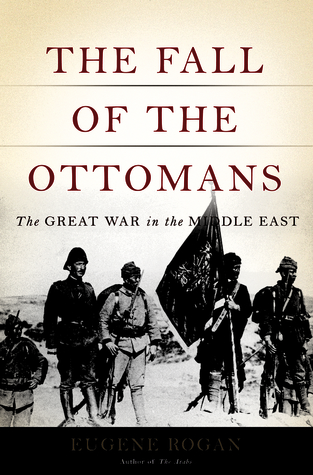
The “Jihad” thing is not a new phenomenon.
The possibility of Jihad was the great terror of the Entente powers and the great hope of the Central powers. Massive efforts were made on one side to fan the flame of religious fanaticism and huge efforts were made on the other side to snuff it out. In the end, it appears to have been much ado about nothing. Islam was never that unified. There was enough resentment against the Ottoman rulers within Muslim domains that the flood of jihadists, supposed to fill the ranks of central armies, never materialized. The grand plan to create mayhem, terror, and disruption all across British and French colonies in the name of Allah amounted to wishful thinking.
I will kill for my nation, not my religion.
Fanning the flames of nationalism proved to be a greater motivator to violence than religion. The Arab revolt fuelled by grand dreams and false promises of a distinctly Arabic nation spanning most of the Middle East was just the ticket to turn Muslims in on themselves. In almost miraculous fashion, the Ottoman Empire had managed to push back Entente invasion forces in Gallipoli, Gaza, Baghdad and other places for over two years, but when the Arab nationalists joined the Entente to rise in revolt against Ottoman rule, it proved to be too much.
Whose side are we on anyway?
Muslims from Africa joined the Entente to fight on the Western front against Germans. As war goes, some of those Muslim soldiers were captured by the Germans. Instead of being sent to a regular POW camp, they were treated nicely, and sent to more of a resort to be indoctrinated about jihad. Ultimately, many of these Muslim POW’s would be repurposed and sent off to fight with the Ottomans as “holy warriors” against the British. Interestingly, many of those same soldiers wound up getting captured again, this time by British forces in the Middle East. A British POW camp in Egypt would be where they would sit out the war. However, I wonder if some of those same men were able to be repurposed again through the call to Arab nationalism? If so, it is quite possible that those soldiers went back into war to fight with the Entente once again – this time against the Ottomans. It would not surprise me if that actually happened, although the book offers no evidence of this final reversal. In the end, these two-sided warriors were let off surprisingly easy – any other traitor would have been shot for treason in this era. These guys just had to endure post-war expulsion from their country/colony of birth.
The Beduins are for the Beduins
C.S. Lewis makes the above statement about the Dwarfs in his Chronicles of Narnia series. What he means is the Dwarfs look out for their own interests above all, there is no higher purpose or unifying cause that supersedes this fundamentally tribal presupposition about life. This describes perfectly the Beduins. They constantly flipped sides whenever it suited their purposes. They looted whenever they won and drifted off into the highlands when things became dangerous or it didn’t serve their purpose. All throughout the war, the Beduins were a constant help and then headache to both British and Ottoman forces.
How do you dominate someone and then get them to fight for you?
It is utterly remarkable to me how the British and French were able to recruit willing soldiers for their armies from their African and Indian colonies. They had invaded these countries and reduced the indigenous people to second-class citizens in their own country! How is it that thousands upon thousands of Indian and African people would willingly sign up to fight in a war that was being waged by their oppressors? Was it the pay? The prospect of adventure? Maybe the British and French influence in these colonies was not as bad for everyone as we have historically thought? I honestly don’t know the answer to this question.
Dumb move to open another front in a terrible war?
In hindsight, the campaign against the Ottoman Empire has been criticized as an unnecessary and foolhardy endeavour. Was it? At the time, I think it actually made good sense. The strategy was for the Entente to try to force a quick end to the war by stabbing at the soft underbelly of the Central powers. Even the Germans were worried about the Ottomans as the weak link. The decision to attack was made because the Ottoman Empire had been in steady decline for over 100 years. They were politically unstable. Civil unrest abounded in the country. The empire had lost three successive wars at the turn of the century, and in the first year of the Great War, they had been crushed by the Russians in the Caucasus Mountains, the British in Mesopotamia, and by the British at the Suez.
On paper, it looked like a good plan – the Ottomans were weak and failing, and since the west was in stalemate, why not? Unfortunately, instead of shortening the war, it probably prolonged it. The Turks fought fearlessly and from better positions and received huge help from their German counterparts.
Why did the Armenian genocide happen?
Some Armenians wanted their own country – nationalism was the flavour of the day. But most were content with life as it was and were patriotic Ottomans – yet periodic persecutions at the hands of Turks and Kurds made life far from ideal for this Christian subset of Ottoman culture.
As the war loomed, the Empire needed to make a decision as to which side they were going to join in on. It was a tough decision, but ultimately they went with the Central powers. Russia had forever been looking lustily to capture Istanbul and many of the other prime lands possessed by the Ottomans. The Russians viewed themselves as the last of the Byzantines, so their claim on Ottoman land pre-dated the Ottomans. The Turks had no desire to fight the Russians, and attempted a peace deal with them. The Russians were not interested.
- Switching Sides: For some time, Armenians had wondered if maybe the Russian capture of the Ottoman lands in which they lived would actually benefit them. Russians were at least Christian. That commonality, it was thought, could lead to more freedom and less persecution, and perhaps even the possibility of an Armenian state. Russia openly courted that idea, making lots of promises to Armenians if they would cross over to their side. Some Armenian soldiers in the Ottoman Army crossed over to fight with the Russians. That didn’t sit well with the Turks.
- Shrinking Empire: The Turks had lost so much territory to nationalist-minded, non-Muslim entities within the borders of their empire over the previous several decades. Romania, Serbia, Montenegro, and Bulgaria all had achieved independence from the Empire, shrinking and weakening it in the process. A similar independence movement with the Armenians would fragment the very heartland of the Turkish people. That was not an option.
- Civil War — Some Armenian nationalists in Eastern Anatolia started a revolt in which they took over an entire city, killed a bunch of Turks in the battle, and held out for Russian liberation.
- Cheering a bit pre-mature — When the British invaded the Dardanelles and were close to conquering Istanbul, Armenians openly cheered the would-be-conquerors on. This exuberance could only be interpreted as treasonous.
The regime known as The Young Turks concluded that all Armenians were a direct threat to national security and must therefore be exterminated. Only a small percentage of Armenians were actually dangerous to Ottoman rule but, in times of war, the controlling powers often don’t take the time to try to discern.
March of Death
Before the war, The Young Turks had ejected the Greek Orthodox from Ottoman lands. Greece had found its independence, and was not a friend to the Ottomans, so the Greeks had to go! The plan was to march them all to Greece and be done with them. It was a difficult situation, to be torn from one’s homeland and sent marching off towards Greece with only what you could carry on your back. But most survived because they had a reachable destination filled with people willing to receive them. This was not the Armenian story. They had no homeland to march to once they were evicted, and the Turks were thinking extermination not expulsion.
To accomplish extermination, the Turks made it seem like they were going to do the same to the Armenians as they had done to the Greeks. However, the expulsion point would be across the Syrian Desert. The brutal elements of the desert ensured that most would never survive the trip. In addition, if any of the marchers slowed down, they were bayoneted. To complete the genocide, the Turks also arranged for Arab tribesmen and Kurdish tribesmen to regularly sweep down violently into the long lines of defenseless captives. Some Armenian children survived because they were taken as slaves to these groups, other young women survived through capture and forced marriage. Most however simply were caught up in this net of death along the way. It is estimated that only about 2% of those forced to go on the death marches actually survived them. In all, approximately 1.5 million Armenians perished.
Ironically, the genocide was of no assistance in helping the Ottoman cause. The Russians still conquered even without Armenian help. Many great and loyal Armenian soldiers were lost to the Ottoman army because of the purge. The Armenian issue was irrelevant to the Arab revolt which actually accelerated the demise of the Ottomans. There is one particularly poignant story to illustrate the senselessness of this genocide: several thousand Armenians managed to escape the death marches by volunteering to work with the Germans on the Berlin to Baghdad railway, an essential link that could have made all the difference in the war. The Turks discovered the Armenians, and, in spite of German protests, preferred to send the willing labourers to their deaths rather than use their help on this vital railway. The railway was never finished. The Ottomans lost the war.
Untenable
Untenable was the most common word in this book. It was probably used several hundred times! As the various armies attacked each other, inevitably their positions would become “untenable”. There would be a retreat, and then the violence would start all over again, until the other side would achieve an equally untenable position. As the bodies of both sides piled up, I felt myself asking the question “Why are we doing this again? There has got to be a better way!” In my mind, the whole idea of war is “untenable”!
Staying alive!
At the end of the war, the Ottoman Empire was completely disassembled. The French and English carved up what was left of the empire for themselves. Even Anatolia, the heartland of the Turks, was chopped up to make space for Greek, Armenian, and Kurdish national interests. At the wars end, hope for even a Turkish state was lost, that is, until Mustafa Kemal Atatürk emerged from the dust of war and refused to accept the terms for peace. Somehow, with a broken army, he managed to push back Greek, Armenian, Kurdish, and even French military forces in order to preserve a Turkish homeland.



